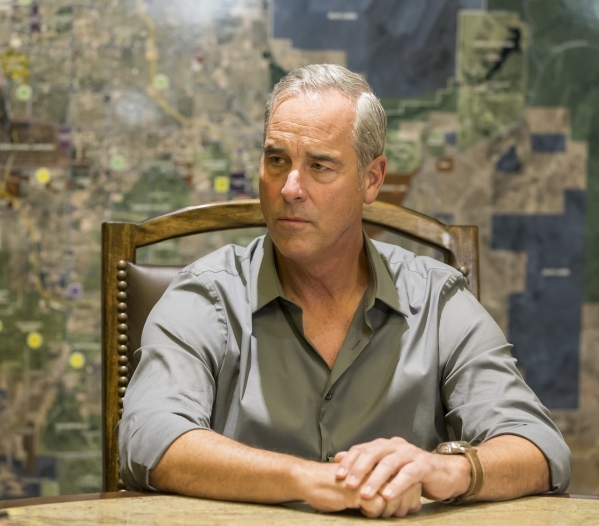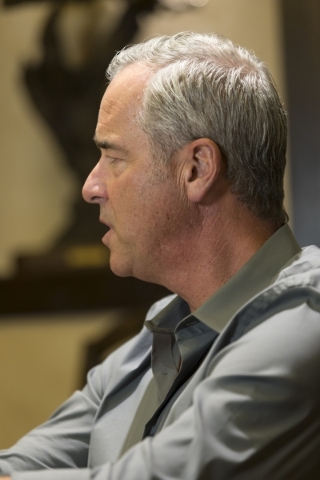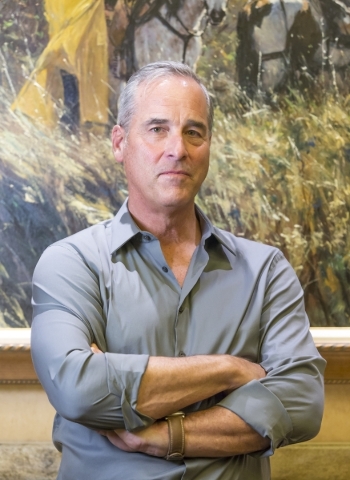Merger opened doors but hasn’t changed Sartini’s business style




He oversees a publicly traded company, but you won’t find Blake Sartini with his attention focused solely on the daily ups and downs of Golden Entertainment’s stock price.
The gaming operator is nearly 4 months old after a $341 million merger that brought together Golden Gaming’s statewide slot machine route operation, Pahrump casinos and the Nevada-leading tavern business with Lakes Entertainment, owners of the Rocky Gap Casino in Maryland.
Sartini, whose family kept a 35 percent ownership stake in the once privately held business, sees no reason to change his or the company’s management style.
“Prior to the merger, we kept our heads down, focused on what we were doing and executed our plan,” said Sartini, 56, who is chairman and CEO of Golden Entertainment. “We’re doing the same thing today, and we know if we do that, we’ll create shareholder value.”
Golden’s origins stem from Southwest Services, a vending machine and pay telephone provider that Sartini began in the 1980s with a high school friend. After leaving a nearly two-decade-long executive position with Station Casinos in 2001, Sartini re-branded Southwest as Golden and changed the focus to tavern development.
Golden operates 46 taverns in Nevada through the PT’s, Sierra Gold and Sean Patrick’s brands. The company recently announced it will add four more locations in Las Vegas next year, including the its first micro-brewery.
“Give or take, we have about 10 percent of the tavern capacity in Clark County,” Sartini said. “So we see the ability to leverage our brands.”
Nevada is home, and the company employs some 2,000 workers statewide. But the merger opened new opportunities.
Lakes closed its headquarters in Minnesota and relocated the business to Golden’s Las Vegas complex off Jones Boulevard near the 215 Beltway. The facility has the aura of a rustic hunting lodge.
Two Lakes employees relocated to Las Vegas, and the company’s corporate finance and accounting staff — headed by Chief Financial Officer Matthew Flandermeyer — was beefed up to reflect its switch to a Nasdaq-listed company.
That’s the extent of the changes to company. Golden’s new capital structure, however, which includes a $160 million line of credit, created new avenues for expansion.
“There are opportunities that have materialized that we wouldn’t have seen in the past,” Sartini said. “This transaction has risen our profile in a sense that we now have the financial capability and managerial expertise to pursue some these opportunities.”
Golden’s place as Nevada’s largest slot machine route operator — managing more than 7,600 slot machines in 670 statewide locations — could be valuable to states considering that line of business. The Nevada routes provided Golden with 65 percent of its overall cash flow in the third quarter. Including the Pahrump casinos and Rocky Gap, Golden operates 9,300 slot machines and 30 table games.
“We have a proven track record in Nevada,” Sartini said.
Golden is already licensed as a slot route operator in Montana through Sartini Gaming, and the company is considering ways to enter the market, which has 16,500 slot machines in bars and taverns. As a comparison, Nevada has 18,500 slot machines under various route operations. Illinois also has a growing slot machine route market, and Golden has “applicant status” in the state.
Pennsylvania is looking into placing slot machines in six of the state’s airports. Oregon, Montana, South Dakota and Louisiana are either considering legalizing a slot route-type business model or expanding a current market. All are potential opportunities for Golden Gaming.
Sartini said the company will explore regional casino investments, capitalizing on its ownership of Rocky Gap, a 200-room hotel-casino inside Rocky Gap State Park near Cumberland, Maryland. The resort includes a Jack Nicklaus golf course and is within a three-hour drive of 10 million people. Sartini said parking and the casino will be increased while plans are being considered to add restaurants and double the size of the hotel.
In October, gaming revenue at Rocky Gap grew 10.8 percent to $4.2 million, adding to the statewide casino increase of 9.1 percent, according to Maryland casino regulators.
Sartini isn’t concerned about next year’s opening of MGM Resorts International’s $1.2 billion hotel-casino in National Harbor, Maryland. Rocky Gap saw little impact from last year’s opening of Horseshoe Casino Baltimore, plus the casino has other customer markets, including Pittsburgh.
“We’re very bullish on the future of this property,” he said.
Sartini gained gaming experience, first with Michael Gaughan, and then with Station Casinos. He served in various management and executive positions, including chief operating officer. His wife, Delise, is the sister of Station Casinos owners Frank Fertitta III and Lorenzo Fertitta.
Now, he watches Station’s moves along with other regional gaming operators.
“As a public company, we do have peers,” Sartini said. “We do digest a lot of information they put up the other companies put up publicly. It’s not as a comparison. We want to make sure we’re up to speed on what’s going on with gaming in general.”
Howard Stutz’s Inside Gaming column appears Wednesdays and Sundays. He can be reached at hstutz@reviewjournal.com or 702-477-3871. Find on Twitter: @howardstutz












